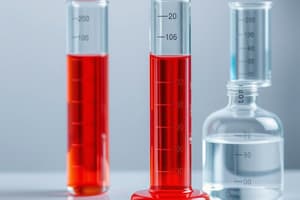Podcast
Questions and Answers
What is the concentration of the iron(II) sulfate solution prepared by adding 2.8 g of FeSO4·7H2O to 1 mL of conc. H2SO4 and diluting to 1 L?
What is the concentration of the iron(II) sulfate solution prepared by adding 2.8 g of FeSO4·7H2O to 1 mL of conc. H2SO4 and diluting to 1 L?
- 0.01 M (correct)
- 2.0 M
- 1.0 M
- 0.1 M
What is the term for the number of equivalents of solute per liter of solution?
What is the term for the number of equivalents of solute per liter of solution?
- Concentration
- Solubility
- Normality (correct)
- Molarity
What is the purpose of a standard solution in quantitative analysis?
What is the purpose of a standard solution in quantitative analysis?
- To provide a precise solution for quantitative analysis (correct)
- To mix with other solutions to create a new solution
- To prepare a saturated solution
- To prepare a supersaturated solution
What is the term for a solution that contains more solute than equilibrium conditions allow?
What is the term for a solution that contains more solute than equilibrium conditions allow?
When preparing a solution, what is the recommended order of addition?
When preparing a solution, what is the recommended order of addition?
What is the term for the substance that does the dissolving in a solution?
What is the term for the substance that does the dissolving in a solution?
Which of the following silver salts is moderately soluble?
Which of the following silver salts is moderately soluble?
What is the purpose of heating the solvent during solution preparation?
What is the purpose of heating the solvent during solution preparation?
What is the concentration of a sodium chloride solution that contains 58.5 g of NaCl per liter?
What is the concentration of a sodium chloride solution that contains 58.5 g of NaCl per liter?
Why is it necessary to stir vigorously during solution preparation?
Why is it necessary to stir vigorously during solution preparation?
What is the effect of pulverizing a solid on its solubility?
What is the effect of pulverizing a solid on its solubility?
What is the maximum amount of solute that can be dissolved in a solvent at a specific temperature?
What is the maximum amount of solute that can be dissolved in a solvent at a specific temperature?
What is the concentration of the potassium ferrocyanide solution?
What is the concentration of the potassium ferrocyanide solution?
What is the purpose of labeling chemicals clearly and permanently?
What is the purpose of labeling chemicals clearly and permanently?
Why is it necessary to heat the solution during preparation?
Why is it necessary to heat the solution during preparation?
What is the total volume of the Benedict's Quantitative Solution after preparation?
What is the total volume of the Benedict's Quantitative Solution after preparation?
What is the purpose of adding the copper sulfate solution to the 1-L flask?
What is the purpose of adding the copper sulfate solution to the 1-L flask?
What is the minimum number of requirements for labeling a chemical?
What is the minimum number of requirements for labeling a chemical?
Flashcards are hidden until you start studying
Study Notes
Insoluble Salts of Silver
- All silver salts are insoluble, except for AgNO3 and AgClO4, which are soluble, and AgC2H3O2 and Ag2SO4, which are moderately soluble.
Factors Affecting Solubility
- A solvent can only dissolve a limited quantity of solute at a definite temperature.
- The rate of dissolving solids can be increased by:
- Pulverizing or grinding up the solid to increase the surface area
- Heating the solvent to increase molecular motion
- Stirring vigorously
- Combinations of these methods can accelerate the dissolving process.
Definitions
- Solute: The substance that is dissolved or has gone into solution (typically a solid).
- Solvent: The substance that does the dissolving (typically a liquid, such as water or alcohol).
- Solution: A uniform homogeneous mixture of two or more substances.
- Normality (N): A concentration unit defined as the number of equivalents of solute per liter of solution.
- Standard Solution: A very precise solution, usually to 3-4 significant figures, used in quantitative analysis or analytical procedures.
- Supersaturated Solution: A solution that contains more solute than equilibrium conditions allow, which is unstable and may precipitate upon slight agitation or addition of a single crystal.
Preparation of Solutions
- To prepare a standard solution, add solid to acid solution, stir, then add to water, and dilute to 1 L.
- To prepare a saturated solution, add solute to water until it no longer dissolves, then stir for 1 hour and filter.
Labeling and Safety
- Always label chemicals clearly and permanently with:
- Identity of contents
- Concentration
- Date of preparation (if applicable)
- Hazard alert (if applicable)
- Your name
Studying That Suits You
Use AI to generate personalized quizzes and flashcards to suit your learning preferences.




